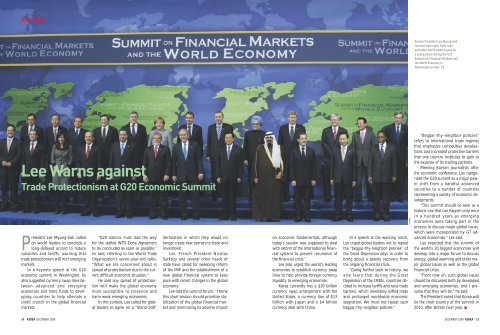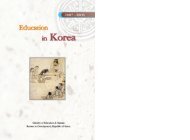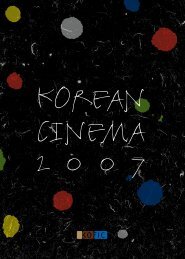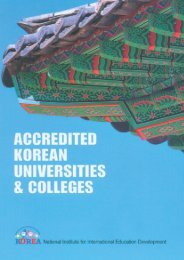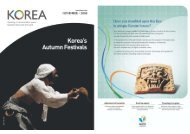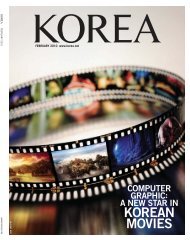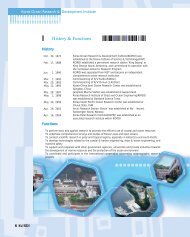Seoul Lights Up for the Holiday Season - Korea.net
Seoul Lights Up for the Holiday Season - Korea.net
Seoul Lights Up for the Holiday Season - Korea.net
You also want an ePaper? Increase the reach of your titles
YUMPU automatically turns print PDFs into web optimized ePapers that Google loves.
DIPLOMACY<br />
<strong>Korea</strong>n President Lee Myung-bak<br />
(second from right, front row)<br />
and o<strong>the</strong>r world leaders pose <strong>for</strong><br />
a group photo during <strong>the</strong> G20<br />
Summit on Financial Markets and<br />
<strong>the</strong> World Economy in<br />
Washington on Nov. 15<br />
Lee Warns against<br />
Trade Protectionism at G20 Economic Summit<br />
President Lee Myung-bak called<br />
on world leaders to conclude a<br />
long-delayed accord to reduce<br />
subsidies and tariffs, warning that<br />
trade protectionism will hurt emerging<br />
markets.<br />
In a keynote speech at <strong>the</strong> G20<br />
economic summit in Washington, he<br />
also suggested currency swap lines between<br />
advanced and emerging<br />
economies and more funds to developing<br />
countries to help alleviate a<br />
credit crunch in <strong>the</strong> global financial<br />
markets.<br />
“G20 nations must lead <strong>the</strong> way<br />
<strong>for</strong> <strong>the</strong> stalled WTO Doha Agreement<br />
to be concluded as soon as possible,”<br />
he said, referring to <strong>the</strong> World Trade<br />
Organization’s seven-year-old talks.<br />
“What we are concerned about is<br />
spread of protectionism due to <strong>the</strong> current<br />
difficult economic situation.”<br />
He said any spread of protectionism<br />
will make <strong>the</strong> global economy<br />
more susceptible to recession and<br />
harm weak emerging economies.<br />
In this context, Lee called <strong>for</strong> global<br />
leaders to agree on a “Stand-Still”<br />
declaration in which <strong>the</strong>y would no<br />
longer create new barriers to trade and<br />
investment.<br />
Lee, French President Nicolas<br />
Sarkozy and several o<strong>the</strong>r heads of<br />
state have called <strong>for</strong> sweeping re<strong>for</strong>m<br />
of <strong>the</strong> IMF and <strong>the</strong> establishment of a<br />
new global financial system to keep<br />
pace with recent changes in <strong>the</strong> global<br />
economy.<br />
Lee told <strong>the</strong> summit <strong>for</strong>um, “I think<br />
this short session should prioritize stabilization<br />
of <strong>the</strong> global financial market<br />
and minimizing its adverse impact<br />
on economic fundamentals, although<br />
today’s session was supposed to deal<br />
with re<strong>for</strong>m of <strong>the</strong> international financial<br />
systems to prevent recurrence of<br />
<strong>the</strong> financial crisis.”<br />
Lee also urged <strong>the</strong> world’s leading<br />
economies to establish currency swap<br />
lines to help provide <strong>for</strong>eign currency<br />
liquidity to emerging economies.<br />
<strong>Korea</strong> currently has a $30 billion<br />
currency swap arrangement with <strong>the</strong><br />
United States, a currency line of $13<br />
billion with Japan and a $4 billion<br />
currency deal with China.<br />
In a speech at <strong>the</strong> working lunch,<br />
Lee urged global leaders not to repeat<br />
<strong>the</strong> “beggar-thy-neighbor policies” of<br />
<strong>the</strong> Great Depression days in order to<br />
bring about a speedy recovery from<br />
<strong>the</strong> ongoing financial crisis.<br />
“Going fur<strong>the</strong>r back in history, we<br />
also learn that during <strong>the</strong> Great<br />
Depression of <strong>the</strong> 1930s, countries decided<br />
to increase tariffs and raise trade<br />
barriers, which inevitably stifled trade<br />
and prolonged worldwide economic<br />
stagnation. We must not repeat such<br />
beggar-thy-neighbor policies.”<br />
Yonhap<br />
“Beggar-thy-neighbor policies”<br />
refers to international trade regimes<br />
that emphasize competitive devaluations<br />
and increased protective barriers<br />
that one country institutes to gain at<br />
<strong>the</strong> expense of its trading partners.<br />
Meeting <strong>Korea</strong>n journalists after<br />
<strong>the</strong> economic conference, Lee categorized<br />
<strong>the</strong> G20 summit as a major power<br />
shift from a handful advanced<br />
countries to a number of countries<br />
representing a variety of economic developments.<br />
“This summit should be seen as a<br />
historic one that can happen only once<br />
in a hundred years as emerging<br />
economies were taking part in <strong>the</strong><br />
process to discuss major global issues,<br />
which were monopolized by G7 advanced<br />
economies,” Lee said.<br />
Lee expected that <strong>the</strong> summit of<br />
<strong>the</strong> world’s 20 biggest economies will<br />
develop into a major <strong>for</strong>um to discuss<br />
energy, global warming and o<strong>the</strong>r major<br />
global issues as well as <strong>the</strong> global<br />
financial crisis.<br />
“From now on, such global issues<br />
should be discussed both by developed<br />
and emerging economies, and I presume<br />
that <strong>the</strong>y will be,” he said.<br />
The President noted that <strong>Korea</strong> will<br />
be <strong>the</strong> chair country of <strong>the</strong> summit in<br />
2010, after Britain next year. ■<br />
14 KOREA DECEMBER 2008<br />
DECEMBER 2008 KOREA 15


